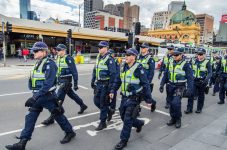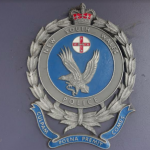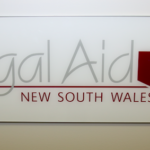Police Allowed to Wear Numberplates

Do you think that police officers should have to wear badges which identify them by name, or are numberplates enough?
The NSW Police Association has said for some time that it is dangerous for members of the police force to wear name badges, as it may lead to officers being targeted by criminals.
Police Association successful
In NSW, police had to wear name badges until January this year, before the government gave officers the choice of wearing a string of unique numbers to identify them instead.
Some have criticised the decision on the basis that name badges are much easier to read and remember, and are an important accountability mechanism – allowing members of the public to accurately identify individual officers and take action if necessary, while a string of numbers is easy to confuse and hard to remember.
The Police Association has denied that the move is about hiding the identities of officers who misbehave. Instead, it argues that numberplates provide officers with protection against harassment, threats and even physical attacks. Terrorism is also cited as a reason for the move.
But those against the move point out that the name and rank of the officer-in-charge of an investigation is printed on the “court attendance notice” that the defendant receives if a matter is going to court, so officers that press charges will be identified in any case.
Critics further point to the fact that the names and ranks of all police who are potentially involved in a case are normally printed on their statements, which are served on the defence after the defendant enters a plea of not guilty.
They additionally assert that the personal details of a police officer – such as their address or direct contact details – cannot be ascertained from the meager information contained in the name badge; rather, there is just enough for the purposes of a complaint.
For those reasons, opponents of the move argue that numberplates will only be useful to officers who wish to hide their misconduct, will make it easier for such officers to engage in illegal or unethical conduct and will do little or nothing to protect officers from being targeted.
They add that, for the reasons mentioned, numberplates will make no difference at all in cases where charges are legitimately brought
Concerns about anonymity
The main purpose of names being displayed is to make sure that police are accountable –in other words, that they can be easily identified and reported if they act illegally.
The argument is that police who feel anonymous, and unlikely to face consequences for their actions, are more likely to engage in misconduct.
In Australia and around the world, police officers have been photographed without their badges employing heavy-handed tactics during public protests. It has been suggested that such anonymity increases the likelihood that police will assault members of the public or otherwise act outside their powers.
During the 2007 APEC protest, over 200 police were photographed without their name badges – and protesters saw this as a way for police to act violently with impunity, knowing that their identity would be difficult to discover.
Are police required to give me their details?
Just as the law requires you to provide police with your details in a range of circumstances – such as when you are pulled over for a random breath test or where you are reasonably suspected of a crime – police in NSW are required to provide you with certain information when they are exercising their powers, too.
In NSW, police powers and responsibilities are primarily contained in the Law Enforcement (Powers and Responsibilities) Act 2002 (the LEPRA).
Under section 202 of the LEPRA, police are required to provide you with evidence that they really are police officers (unless they are in uniform), their name and place of duty, and the reason for the exercise of their power. If there is more than one officer, only one of them is required to give you that information. But whether police comply with the requirements is another story, and it is not unusual to hear accounts of police officers refusing to provide details when asked.
If you have been mistreated by police, you can always make a complaint – provided of course that you are able to identify the officer or officers responsible. If you have made a complaint and are not satisfied with the outcome, you may wish to speak with a lawyer about the possibility of pursuing a civil claim for compensation.






